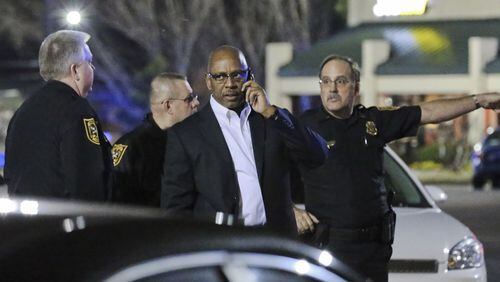The stream of public corruption allegations in DeKalb County could soon result in metro Atlanta’s first police unit designed to investigate elected officials and county workers for misdeeds.
The final straw appears to have been this week’s revelation that an unnamed DeKalb politician is cited in a federal racketeering case in South Carolina that stretches across three Southern states. The six sitting commissioners and interim CEO Lee May, who was a commissioner during the 2011 incidents cited in the federal criminal case, have all denied being that elected official described as soliciting kickbacks.
The name is most likely to be made public during the trial in June – the same month that suspended CEO Burrell Ellis heads to court on 14 felony charges alleging he shook down county vendors for campaign cash and punished those who didn’t give.
“We have to go at these accusations full bore,” said Public Safety Director Cedric Alexander, who proposed the unit to May on Tuesday. “There will be no witch hunts. We will follow the facts. The people of DeKalb County deserve that.”
May agrees with the need for such a unit in DeKalb, and Alexander has begun to research how other police departments establish and use specialized squads. No such units exist in the metro region’s other county police departments or the department serving Atlanta, according to officials in those offices.
That could be because those officers and detectives are charged with investigating many of the same political leaders who fund their operations, said Kerwin Swint, chairman of Kennesaw State University’s political science department.
In that regard, the unit could become as ineffective as Georgia’s state ethics commission, which had been “tied up in knots” for years over allegations of cronyism and political vendettas, Swint said. This month, jurors awarded $700,000 to the former Georgia ethics commission director after ruling in her favor in a lawsuit in which she said her salary had been cut and a deputy removed for investigating complaints against Gov. Nathan Deal.
“It’s a complicated thing, for government to investigate itself without it becoming political,” he said. “You can see the potential of it not being effective at all.”
Still the new unit has the support, at least in concept, from May and the presiding officer of the county commission. Although May has the power to create the unit, it will fall to the commission to determine its funding level.
The commission has dawdled before on giving extra money to internal watchdogs. The commission debated for months whether to increase the budget of its ethics board from just $12,500 a year.
Concerns over making the board too powerful lingered into this year, even after public pressure supporting a special grand jury report that described the board as one antidote to DeKalb’s culture of corruption.
The ethics board ultimately received a $118,000 budget for its work – and retains the power to remove elected officials from office and fire nearly every county worker if allegations are deemed flagrant enough.
The police unit would add the threat of criminal arrest to that mix. That task now falls to the DeKalb District Attorney’s public integrity unit, whose work led to Ellis’ indictment.
In theory, the police unit would work with the DA’s team much the same way a public corruption bureau in the Miami-Dade Police Department works with state and federal prosecutors in Florida.
The Miami-Dade bureau was set up in the late 1990s to provide an investigative arm into suspected bid-rigging and kickbacks between a contractor and county workers, said Sgt. B. Pfeiffer.
The team grew to about two dozen detectives and about seven supervisors until it was downsized last year. Elected officials said they scaled back due to budget constraints, though police union leaders described the cuts as politically motivated.
Still, the unit’s work has led to several arrests, including two on ballot fraud last year and the 2010 arrest of Miami City Commissioner Michelle Spence-Jones, who was later found not guilty of two charges of attempting to solicit bribes.
“In our bureau, you’re following money and looking at records that are a completely different aspect of most police work, but you need that to maintain the integrity of government,” said Pfeiffer. “We get the cases and people who don’t know where else to go.”
May said he expects proposed unit to include a tip line, where workers or residents can be anonymous when reporting complaints. Other details have yet to be worked out, but should be ready for public discussion in about a month, he said.
“It’s sad to say, but these accusations give us an opportunity to take it upon ourselves to look into how we do business and what needs to change,” May said.
About the Author







